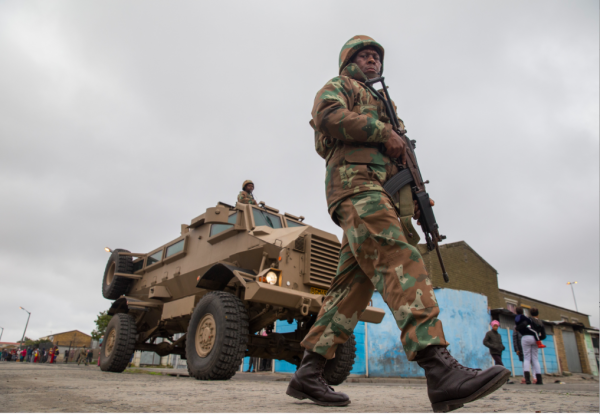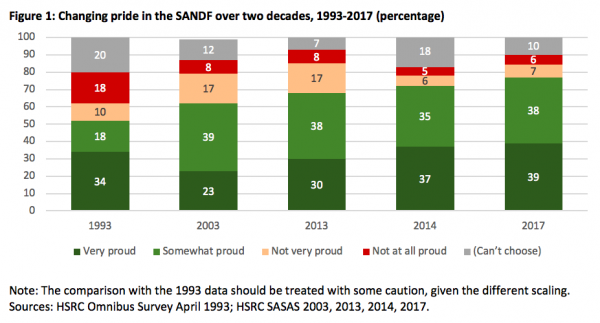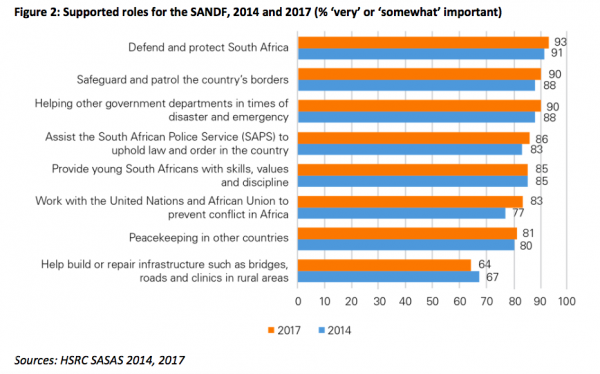Not a 'skop, skiet en donner' moment: Defence Force deployment in the time of COVID-19
DATE: 6 April 2020
With the deployment of the South African National Defence Force (SANDF) for three months to assist the police in containing the spread of the COVID-19 pandemic, it is important to reflect on the nature of civil-military relations in the country, and the influence that this mission may have on continued public support. Looking at national survey data on attitudes towards the SANDF, Jarè Struwig, Dr Ben Roberts and Dr Steven Gordon point out that the public’s high level of trust in and support of the SANDF is likely to be critically tested by the conduct of soldiers during the national lockdown.
On 23 March, President Ramaphosa announced a 21-day national lockdown, and stated that the SANDF would be deployed countrywide to support government’s efforts to reduce the spread of Covid-19. Three days later, on the eve of this operation, the Commander-in-Chief appeared in military uniform to address SANDF personnel. He referred to the mission as the most important in the country’s history due to its focus on protecting and saving civilian lives in the face of a rapidly spreading global pandemic. In a directive to the soldiers, he stressed that the operation would be conducted in the most “understanding, respectful and supportive” way. “The people of our country will be looking upon you as their defenders ... the defenders of our nation, and you will need to restore trust and confidence”.
Deployment as part of a broader defence mandate
The decision to deploy the SANDF was to be expected, given that it has assisted the police regularly in recent years. Examples include army deployment to the Cape Flats in 2019 to assist the police to maintain law and order, and helping to curb xenophobic violence in Johannesburg and KwaZulu-Natal in 2015. This is in line with the idea of a broader defence mandate, as suggested in the 2014 South African Defence Review. Apart from defending and protecting the country, a strong developmental role is envisaged, such as applying military expertise to assist with projects like the rehabilitation of the Vaal River between 2018 and 2020.

In 2019, the South African National Defence Force was deployed to assist the police to quell gang violence on the Cape flats in Cape Town. During the COVID-19 lockdown, they went back to support the government's efforts to reduce the spread of the disease.
Photo: Ashraf Hendricks/GroundUp
Public opinion: A key weapon in the war against the coronavirus
Public attitudes towards the SANDF and the police will be key to the success of attempts to bring the COVID-19 pandemic under control through enforced lockdown procedures. Trust in an institution such as the SANDF is influenced by perceptions of fairness and effectiveness. In turn, trust promotes legitimacy, by encouraging a sense of shared moral values, a perception that SANDF personnel comply with the law and a belief in the duty to obey them. Finally, trust and legitimacy encourage the willingness to cooperate with the SANDF, and, in the current context, adhere to the lockdown regulations to socially isolate.
The nature of public contact with deployed soldiers in their areas of residence during coming weeks has the ability to either enhance or erode trust, legitimacy and compliance. The media also has a role to play in providing the public with information about the conduct of army personnel during the COVID-19 operation. If the SANDF is not seen as a trusted, legitimate institution, communities might deliberately disregard national regulations and act out in ways that provoke the soldiers.
The good news: Robust public support for the SANDF
The HSRC Omnibus Survey of April 1993 and the South African Social Attitude Survey (SASAS) rounds of 2003, 2013, 2014 and 2017, include trends in the public’s attitude towards the SANDF. These surveys represent the views of adult South Africans of 16 years and older, nationally.
Pride in the SANDF
To gain an overall view of how South Africans feel about the SANDF, a question was posed about pride in and the legitimacy of the SANDF over nearly 25 years. In 1993, as shown in Figure 1, 52% of South Africans were either very proud or somewhat proud, and by late 2017, this had increased to 77%. These results point to an improving public image of the SANDF over the last two decades.
Supported roles for the SANDF
In line with the strategic defence goals and tasks outlined in the 2014 Defence Review, respondents to the 2014 and 2017 SASAS surveys were asked their degree of support for a range of traditional and less conventional military roles. From the results (Figure 2), it would appear that South Africans generally deemed the conventional roles of the SANDF to be paramount, notably defending and protecting South Africa and safeguarding the boarders (supported by 93% and 90% respectively). Furthermore, in 2017, 90% of South Africans indicated support for the expanded role of helping other government departments in times of disaster or emergency, and 86% were supportive of the SANDF assisting the SAPS to uphold law and order in the country.
These percentages clearly indicate that the public sees value in the SANDF in assisting to uphold law and order, and assisting in times of disaster or emergency. Interestingly, the defence roles that ranked lower than others but still receive high support were helping to build or repair infrastructure such as bridges, roads and clinics in rural areas, and working with organisations such as United Nations and African Union to resolve conflict in Africa.
The potential risk: Allegations of abuse
A source of concern, from a public opinion perspective, is the alleged cases of abuse of authority by deployed SANDF personnel. During the first week of the lockdown, video footage shows soldiers forcing people who were flouting lockdown restrictions to do squats, push-ups and roll on the floor. This resulted in calls for investigations by the Military Ombud and disciplinary action, and has led the defence minister Mapisa-Nqakula to condemn such unlawful actions and appeal for deployed soldiers to play a positive role in their interactions with citizens. While these alleged abuses are probably isolated incidents, they received widespread coverage in the domestic and international media and on social media, and have the potential to negatively influence attitudes towards the SANDF.
South Africa is not alone in this challenge. Condemnation of alleged abuse of power and excessive force meted out by security personnel during coronavirus-related curfews and lockdowns have been reported in a growing range of countries. These have included reported incidents in India, Kenya, Rwanda, Mauritius, Paraguay, the Philippines, Hong Kong, and France. In many cases, alleged abuse tended to disproportionately affect the poor and vulnerable. Poorer citizens often live in low-income neighbourhoods, settlements and villages where living spaces are cramped and poorly ventilated, with limited access to basic household services such as water and sanitation. Limited income means that stockpiling of basic food and other provisions is improbable, and COVID-19 restrictions on movement become highly challenging.
The infringement on human rights by excessive force and humiliating punishment will undermine trust in the SANDF, which could lead to a disobedience of regulations and contribute further to the spread of the virus.
The mission ahead
From the figures and data presented above, it is apparent that most South Africans support a more expansive defence mandate and have grown prouder and more trusting of the SANDF. But the COVID-19 crisis will be a new litmus test for the defence force.
As President Ramaphosa remarked upon SANDF deployment, “this is not a moment for skop en donner. This is not a moment for skiet en donner. This is a moment to be supportive to our people. When they see you patrol with your guns, they will be fearful, but make sure that when they see you, they see the kindness of the state of South Africa”. We can only hope that the security forces heed to this message of compassion and that the battle is fought against the virus and not against our people.
Authors: Jarè Struwig and Dr Ben Roberts, chief research specialists and coordinators of the South African Social Attitudes Survey, Dr Steven Gordon, senior research specialist, in the HSRC’s Democratic, Capable and Ethical State (DCES) division.
Note
‘Skop, skiet en donner’ translates literally from Afrikaans as ‘kick, shoot and hit’, and is a phrase generally associated with violent action and melodramatic adventure (often in the context of films). The 2014 and 2017 SASAS data on attitudes towards the SANDF is derived from work commissioned by the SANDF.



